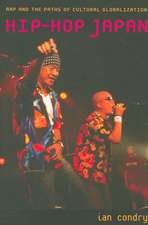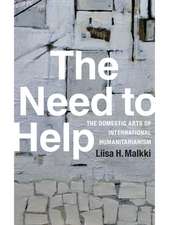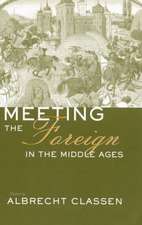The Soul of Anime – Collaborative Creativity and Japan`s Media Success Story: Experimental Futures
Autor Ian Condryen Limba Engleză Paperback – 10 feb 2013
Din seria Experimental Futures
-
 Preț: 194.09 lei
Preț: 194.09 lei -
 Preț: 173.62 lei
Preț: 173.62 lei -
 Preț: 260.69 lei
Preț: 260.69 lei -
 Preț: 174.22 lei
Preț: 174.22 lei -
 Preț: 239.64 lei
Preț: 239.64 lei -
 Preț: 218.52 lei
Preț: 218.52 lei -
 Preț: 174.12 lei
Preț: 174.12 lei -
 Preț: 192.74 lei
Preț: 192.74 lei - 23%
 Preț: 567.39 lei
Preț: 567.39 lei -
 Preț: 173.99 lei
Preț: 173.99 lei -
 Preț: 193.98 lei
Preț: 193.98 lei -
 Preț: 193.44 lei
Preț: 193.44 lei -
 Preț: 215.05 lei
Preț: 215.05 lei -
 Preț: 193.27 lei
Preț: 193.27 lei -
 Preț: 252.13 lei
Preț: 252.13 lei -
 Preț: 201.62 lei
Preț: 201.62 lei -
 Preț: 219.61 lei
Preț: 219.61 lei -
 Preț: 242.06 lei
Preț: 242.06 lei -
 Preț: 175.65 lei
Preț: 175.65 lei -
 Preț: 175.69 lei
Preț: 175.69 lei -
 Preț: 215.66 lei
Preț: 215.66 lei -
 Preț: 137.49 lei
Preț: 137.49 lei -
 Preț: 264.26 lei
Preț: 264.26 lei -
 Preț: 261.38 lei
Preț: 261.38 lei -
 Preț: 306.99 lei
Preț: 306.99 lei -
 Preț: 239.38 lei
Preț: 239.38 lei -
 Preț: 259.42 lei
Preț: 259.42 lei -
 Preț: 306.00 lei
Preț: 306.00 lei -
 Preț: 214.21 lei
Preț: 214.21 lei -
 Preț: 301.97 lei
Preț: 301.97 lei -
 Preț: 220.64 lei
Preț: 220.64 lei -
 Preț: 261.18 lei
Preț: 261.18 lei -
 Preț: 266.18 lei
Preț: 266.18 lei -
 Preț: 304.10 lei
Preț: 304.10 lei -
 Preț: 260.41 lei
Preț: 260.41 lei -
 Preț: 261.38 lei
Preț: 261.38 lei - 23%
 Preț: 886.19 lei
Preț: 886.19 lei
Preț: 166.55 lei
Nou
Puncte Express: 250
Preț estimativ în valută:
31.87€ • 33.36$ • 26.37£
31.87€ • 33.36$ • 26.37£
Carte disponibilă
Livrare economică 17-31 martie
Livrare express 28 februarie-06 martie pentru 24.94 lei
Preluare comenzi: 021 569.72.76
Specificații
ISBN-13: 9780822353942
ISBN-10: 0822353946
Pagini: 256
Ilustrații: 32 illustrations
Dimensiuni: 157 x 233 x 14 mm
Greutate: 0.36 kg
Ediția:New.
Editura: MD – Duke University Press
Seria Experimental Futures
ISBN-10: 0822353946
Pagini: 256
Ilustrații: 32 illustrations
Dimensiuni: 157 x 233 x 14 mm
Greutate: 0.36 kg
Ediția:New.
Editura: MD – Duke University Press
Seria Experimental Futures
Recenzii
"Does anime have a soul? In The Soul of Anime, Ian Condry explores the lives and work of the creators and consumers of one of Japan's great contributions to popular culture. Condry shows how the genre has moved from the margins to a place of respect and influence. This is a book that will appeal to all the otaku out there, as well as to those with a more moderate love of anime in all its forms."Eric Nakamura, President, Giant Robot
"Through an exploration of multiple dimensions of the anime object, from studio production to fan production, piracy, remix, and virtual idols, The Soul of Anime issues a bold challenge to our understanding of the social side of media. Ian Condry's attention to the singularities of this universe takes us far from the normative horizon of analysis of fans and commodities, highlighting how intimacy arises from impersonal affective life. The social side of anime is the soul of anime, and the dark energy of fans is nothing other than the psychosocial stuff, the vibrant matter, of this emerging constellation."Thomas LaMarre, author of The Anime Machine: A Media Theory of Animation
"In this informative and absorbing volume, the author examines Japan's vast contributions to the animation world and global culture at large. Using extensive interviews with auteurs such as Mamoru Hosoda (The Girl Who Lept Through Time, Summer Wars) and Peter Chung (Aeon Flux, Firebreather), studio visits to Toei, Gonzo, Ghibli and Studio 4C, and case studies of shows such as Zenmai Zamurai and Deko Boko Friends, the author offers colorful snapshots of the modern anime milieu and the talented artists who continue delivering outstanding work despite the lack of real monetart rewards."--Animation Magazine, April/May 2013
An anthropologist by training, Condry bases his arguments in part on fieldwork consisting of interviews with studio personnel and direct observation of working practices. One may question (as the author himself does) how representative these anecdotes are, but they stimulate numerous intriguing interpretations. Although sometimes verbose, Condry writes thoughtfully and occasionally displays wry wit. His book contains much of value to scholars of Japanese popular culture. - Alexander Jacoby, Times Literary Supplement
"Does anime have a soul? In The Soul of Anime, Ian Condry explores the lives and work of the creators and consumers of one of Japan's great contributions to popular culture. Condry shows how the genre has moved from the margins to a place of respect and influence. This is a book that will appeal to all the otaku out there, as well as to those with a more moderate love of anime in all its forms." - Eric Nakamura, President, Giant Robot "Through an exploration of multiple dimensions of the anime object, from studio production to fan production, piracy, remix, and virtual idols, The Soul of Anime issues a bold challenge to our understanding of the social side of media. Ian Condry's attention to the singularities of this universe takes us far from the normative horizon of analysis of fans and commodities, highlighting how intimacy arises from impersonal affective life. The social side of anime is the soul of anime, and the dark energy of fans is nothing other than the psychosocial stuff, the vibrant matter, of this emerging constellation." - Thomas LaMarre, author of The Anime Machine: A Media Theory of Animation "In this informative and absorbing volume, the author examines Japan's vast contributions to the animation world and global culture at large. Using extensive interviews with auteurs such as Mamoru Hosoda (The Girl Who Lept Through Time, Summer Wars) and Peter Chung (Aeon Flux, Firebreather), studio visits to Toei, Gonzo, Ghibli and Studio 4C, and case studies of shows such as Zenmai Zamurai and Deko Boko Friends, the author offers colorful snapshots of the modern anime milieu and the talented artists who continue delivering outstanding work despite the lack of real monetart rewards."--Animation Magazine, April/May 2013 "An anthropologist by training, Condry bases his arguments in part on fieldwork consisting of interviews with studio personnel and direct observation of working practices. One may question (as the author himself does) how representative these anecdotes are, but they stimulate numerous intriguing interpretations. Although sometimes verbose, Condry writes thoughtfully and occasionally displays wry wit. His book contains much of value to scholars of Japanese popular culture." - Alexander Jacoby, Times Literary Supplement
"Through an exploration of multiple dimensions of the anime object, from studio production to fan production, piracy, remix, and virtual idols, The Soul of Anime issues a bold challenge to our understanding of the social side of media. Ian Condry's attention to the singularities of this universe takes us far from the normative horizon of analysis of fans and commodities, highlighting how intimacy arises from impersonal affective life. The social side of anime is the soul of anime, and the dark energy of fans is nothing other than the psychosocial stuff, the vibrant matter, of this emerging constellation."Thomas LaMarre, author of The Anime Machine: A Media Theory of Animation
"In this informative and absorbing volume, the author examines Japan's vast contributions to the animation world and global culture at large. Using extensive interviews with auteurs such as Mamoru Hosoda (The Girl Who Lept Through Time, Summer Wars) and Peter Chung (Aeon Flux, Firebreather), studio visits to Toei, Gonzo, Ghibli and Studio 4C, and case studies of shows such as Zenmai Zamurai and Deko Boko Friends, the author offers colorful snapshots of the modern anime milieu and the talented artists who continue delivering outstanding work despite the lack of real monetart rewards."--Animation Magazine, April/May 2013
An anthropologist by training, Condry bases his arguments in part on fieldwork consisting of interviews with studio personnel and direct observation of working practices. One may question (as the author himself does) how representative these anecdotes are, but they stimulate numerous intriguing interpretations. Although sometimes verbose, Condry writes thoughtfully and occasionally displays wry wit. His book contains much of value to scholars of Japanese popular culture. - Alexander Jacoby, Times Literary Supplement
"Does anime have a soul? In The Soul of Anime, Ian Condry explores the lives and work of the creators and consumers of one of Japan's great contributions to popular culture. Condry shows how the genre has moved from the margins to a place of respect and influence. This is a book that will appeal to all the otaku out there, as well as to those with a more moderate love of anime in all its forms." - Eric Nakamura, President, Giant Robot "Through an exploration of multiple dimensions of the anime object, from studio production to fan production, piracy, remix, and virtual idols, The Soul of Anime issues a bold challenge to our understanding of the social side of media. Ian Condry's attention to the singularities of this universe takes us far from the normative horizon of analysis of fans and commodities, highlighting how intimacy arises from impersonal affective life. The social side of anime is the soul of anime, and the dark energy of fans is nothing other than the psychosocial stuff, the vibrant matter, of this emerging constellation." - Thomas LaMarre, author of The Anime Machine: A Media Theory of Animation "In this informative and absorbing volume, the author examines Japan's vast contributions to the animation world and global culture at large. Using extensive interviews with auteurs such as Mamoru Hosoda (The Girl Who Lept Through Time, Summer Wars) and Peter Chung (Aeon Flux, Firebreather), studio visits to Toei, Gonzo, Ghibli and Studio 4C, and case studies of shows such as Zenmai Zamurai and Deko Boko Friends, the author offers colorful snapshots of the modern anime milieu and the talented artists who continue delivering outstanding work despite the lack of real monetart rewards."--Animation Magazine, April/May 2013 "An anthropologist by training, Condry bases his arguments in part on fieldwork consisting of interviews with studio personnel and direct observation of working practices. One may question (as the author himself does) how representative these anecdotes are, but they stimulate numerous intriguing interpretations. Although sometimes verbose, Condry writes thoughtfully and occasionally displays wry wit. His book contains much of value to scholars of Japanese popular culture." - Alexander Jacoby, Times Literary Supplement
Notă biografică
Descriere
In The Soul of Anime, Ian Condry explores the emergence of anime, Japanese animated film and television, as a global cultural phenomenon.




















